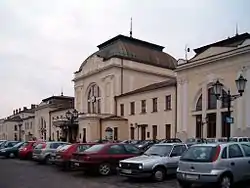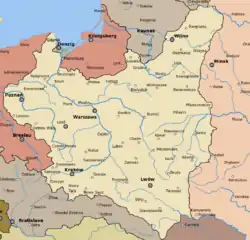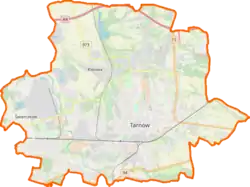Tarnów train station bombing
The Tarnów train station bombing was a deadly bombing carried out by a German saboteur two days before the start of World War II in Europe. The attack took place in the city of Tarnów in Poland of the interwar period, ahead of the joint invasion of Poland by Nazi Germany and the Soviet Union. The time bomb planted by the secret agent exploded inside the station on the night of 28 August 1939, killing 20 people and wounding 35 others.[1]
| Tarnów train station bombing | |
|---|---|
| Part of Nazi terrorist attacks preceding invasion of Poland | |
 Approximately a third of the train station collapsed due to the bombing.  | |
 Tarnów train station Tarnów train station (Tarnów) | |
| Location | Tarnów |
| Date | 28 August, 1939 23:18 |
| Weapons | Two time bombs hidden in suitcases |
| Deaths | 20 |
| Injured | 35 |
| Perpetrators | Antoni Guzy |
The population of Tarnów in 1939 was around 40,000. The busy train station of Tarnów Główny (Tarnów Central) was located on the railway line connecting two major agglomerations in southern Poland, Kraków to the west and Lwów to the east. Trains passed through Tarnów carrying thousands of travelers. The threat of imminent conflict with Germany added to the awaiting crowd many army reserve soldiers ordered to report to their units, as the international situation worsened day by day. The dense traffic was halted abruptly at 11:18 p.m., when a time bomb left by a German saboteur, Anton Guzy, exploded in the waiting hall. Twenty people at the station died instantly. It has been argued by commentators that the world war had just began.[2]
Attack
The saboteur who planted the bomb – a man named Antoni (Anton) Guzy from Bielsko – was the son of a German mother and a Polish father.[3] His father died during World War I, and in 1938 Guzy, a locksmith, became unemployed. In search of a job, he joined the Gewerkschaft Deutscher Arbeiter, a local organization which helped to organize employment in Germany.[2]
It was probably through this agency that he was persuaded to carry out the attack.[3] Guzy traveled to Tarnów from Gliwice with the man named Neumann.[2] He left two suitcases packed with explosives in the luggage hall and went to a platform to wait for a night Luxtorpeda train from Krynica, via Tarnów, to Kraków, which, according to the schedule, would leave at 11:02 p.m. It is speculated that Guzy might not have known when the bomb would explode. He drank a beer at the station's restaurant, before taking a walk around the station. When the explosion took place, the saboteur, together with other passengers ran away in panic. Reportedly, his German masters might have planned for him to die in the attack.[3]
The number of victims would have been much higher, had it not been for a stopping train from Kraków, which arrived eight minutes late. Also, a few minutes before the attack, a military transport with numerous soldiers had left the Tarnów station. Approximately one-third of the station building was destroyed. Rail workers and policemen spent hours searching for victims in the rubble.[3]
It is impossible to reconstruct all the details of the attack. At 11:30 a.m. Guzy met a man from Skoczów named Neuman (given name unknown to him), who was a member of a German saboteur organization. Together, they went by rail to Kraków, leaving Bielsko-Biała station at 12:13 p.m. In Kraków they had coffee, and later took two heavy suitcases from a station's luggage office. According to Guzy's later statement, Neuman told him to leave both cases at the Tarnów station and return to Kraków, where he would be waiting.
After the explosion, Guzy was stopped by the railroad police, asked for his identity papers and released. Stopped again near the station, he was recognised as the man who had left the suitcases. During the interrogation he said that he felt sorry about what had happened, and that he had never received any money. Guzy's subsequent fate is uncertain.[3] The German investigation conducted in 1941 concluded that he was shot in the first days of September 1939, before invading Germans reached the area.[4]
Notes
- Krzysztof Gzyl (2018). "Bombing attack at the train station in Tarnów" [Zamach bombowy na tarnowskim dworcu kolejowym]. Taka jest historia (in Polish). Tarnów i region at it.tarnow.pl.
- The Bomb Attack at Tarnów. Polish Western Affairs. Volume 27. Instytut Zachodni. 1986. pp. 243–247, 267. ISSN 0032-3039. OCLC 1606392.
On the night of August 18, Guzy and Neumann, travelling in separate compartments, transported the explosives by train to Lwów. Guzy sent two suitcases as registered luggage and carried a parcel with him. Neumann carried four suitcases with him. – Neumann was to look after the explosives in Lwów. On the evening of 24 August 1939 (according to Guzy), Breslau radio broadcast the appointed signal for the attack: "A special announcement, Dr Funk is to set to work" (Sondermeldung, Dr. Funk soll an die Arbeit gehen). It is significant that an almost identical signal was recorded by the monitoring service of the Silesian police: "Comrades Dr Funk and Eichenholz are to set to work immediately and report" (Kameraden Dr. Funk und Eichenholz haben die Arbeit sojort aujzunehmen und sich dann zu melden) It appears to be the same command. The cryptonym Dr Funk is also known from elsewhere. This was the name of a subversive unit of Volksdeutsche who operated in the Chodziez district on 1 September 1939.
- Łukasz Winczura (September 30, 2008). "How the Fifth Column started the world war..." [Jak piąta kolumna, wojnę światową zaczynała...]. Salon 24 (in Polish). Archived from the original on March 30, 2012 – via Internet Archive.
24 sierpnia 1938 roku przez radiostację wrocławską popłynął w eter lakoniczny komunikat wygłoszony po niemiecku : "Herr Doktor Funk soll an die Arbeit gehen". Był to znak dla grup dywersantów niemieckich, by przystępowali do planowanych wcześniej akcji... W Gliwicach na szyfrowany "apel radiowy" odpowiedział ochoczo niejaki Antoni Guzy, którego sabotażowy przydział przypadł na Tarnów.
- Zygmunt Szych (August 28, 2017). "Explosion at Tarnów Train Station. The terrorist came by taxi. How did Antoni Guzy died?" [Wybuch na tarnowskim dworcu. Zamachowiec przyjechał taksówką. Jak zginął Antoni Guzy?]. tarnow.in (in Polish).
External links
- http://www.gazetawyborcza.pl/1,75480,2887486.html (in Polish)
- https://web.archive.org/web/20071225095343/http://www.tarnow.pl/historia/taka/1.php (in Polish)
- http://www.diapozytyw.pl/pl/site/slady_i_judaica/tarnow (in Polish)
- https://web.archive.org/web/20080217020218/http://www.go-tarnow.com/english/worth_seeing/tarnow-history.html (in English)
- https://web.archive.org/web/20080225161215/http://www.bbc.co.uk/history/worldwars/wwtwo/countdown_390829_tue_04.shtml (in English)
- Photos of the station after the attack, taken in the morning on Tuesday, August 29, 1939